2018 FINA Budapest Water Polo Conference: On The Record with Dragan Jovanovic
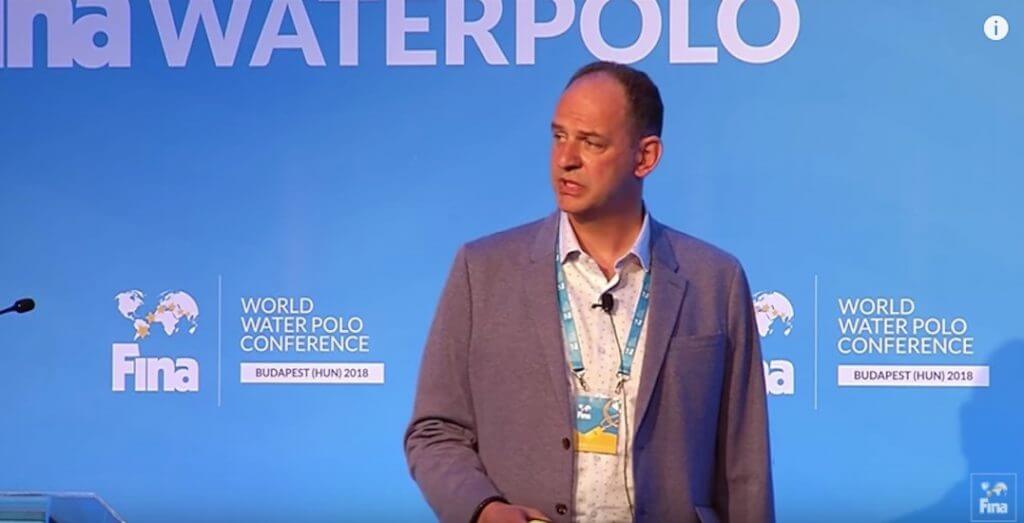
By Michael Randazzo, Swimming World Coordinator
Editor’s note: For three days (April 26-28) 244 delegates from 100 countries gathered at Budapest’s InterContinental Hotel to discuss current and future prospects for water polo, the oldest Olympic team sport. Streaming media of the conference proceedings can be found here.
In what many participants have described as a seminal moment for the sport, after three days of presentations, round-table discussions and communal meals at the 2018 FINA Budapest Water Polo Conference, optimism was restored about the future of water polo, the oldest Olympic team sport.
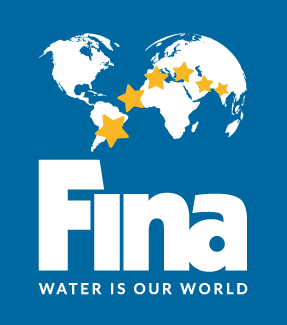
Efforts by Dragan Jovanovic to analyze polo’s current situation and proscribe specific remedies for the sport’s ills are one reason for the positive vibes following FINA’s first water polo conference in four years. President & CEO of DJ Global Wave of Canada as well as Executive Director for the World Water Polo Coaches Association (WWPCA), Jovanovic led in-depth panel discussions about promoting polo, making it comprehensible to the average sporting fan, and reforming a sport that appears constrained by outdated rules.
A former goalkeeper for Yugoslavia and Serbia in the 1990’s, Jovanovic and his family emigrated to Canada in 2001. First as an assistant to and then a head coach of Canada’s Senior Men’s National Team, in 2008 his helmed the squad that captured the country’s first Olympic men’s water polo berth since 1984. Starting in 2015 Jovanovic has organized HaBa WaBa North America, an annual water polo festival for athletes ages 6 to 13.
Last week Swimming World spoke with Jovanovic about his experience at the conference, the many changes he and his fellow coaches at the WWPA have proposed, how other sports—including basketball—provide useful lessons that water polo coaches and administrators might learn from, and what the future holds.
– What is the net impact of gathering in Budapest so many folks from all over the world to talk about the sport?
In my mind this conference was all about modernizing water polo. To connect the community—I cannot say that was the case before—and to get the ideas and the perspective from the experts. And when I say experts I’m not just talking about the coaches. I’m talking about the officials, the players, marketing people, social media people, because everything is connected to the improvement of water polo. People had the wrong idea that if they change only the rules that everything else will change.
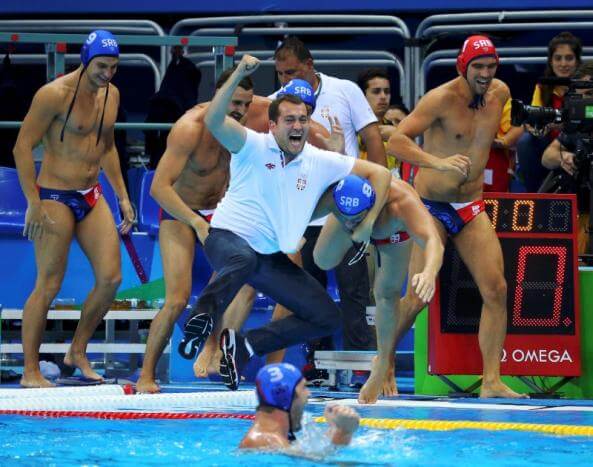
Serbian men celebrate Olympic gold in Rio. Photo Courtesy: Laszlo Balogh
Of course the rules have to be modernized. Some of them we don’t need. But we do need to address issues such as too many whistles, too many ordinary fouls. The brutality in the center forward position.
We need to define what is the foul, and so on. But just doing that will not promote our sport. If we’re going to have more people in the stands it’s going to be because of more media [attention], more television coverage.
Addressing the rules will help but there’s a whole other part of the sport in the 21st century that needs to be seriously addressed. Improvements and investments need to be made. There’s no business in the world that will make a profit without investments.
It would be really beneficial for coaches, for referees, for athletes and for FINA to get together and analyze the previous year and make adjustments. I see this [process] as ongoing; I’m hopeful that it will happen that way.
– The general message out of the Budapest conference is that it was an extremely productive gathering. If and when you all meet again in two to four years what do you think will have been accomplished?
First thing is we still need a strategic plan—where to go from this point. There were great discussions but we need a plan to realize all those strategies in the future. We’ll have a lot of work on that over the next two years.
The important thing is to collect the data. Statistical analysis needs to be done objectively and subjectively. Statistic can show you some things but it can’t give you a feel for the game.
Another thing we have to do is talk to spectators and marketing people. And then to present and compare. We’re in April 2018 and we need to look at that [compared with] 2020.
I see this as an on-going thing, not once in 30 years. If we look at it that way, we may end up in the same boat 30 years from now. So it has to be a constant thing—monitoring, data collection, analysis and discussion.
– One of the more striking presentations was by the Japanese head coach, Yoji Omoto, who said that—in order to survive—the rules of the sport have to be adapted for athletes who play all over the world.
I both agree and disagree with that. First of all, I don’t think that any governing body has to make the rules that suit all countries. No one does this in any federation that I know of.
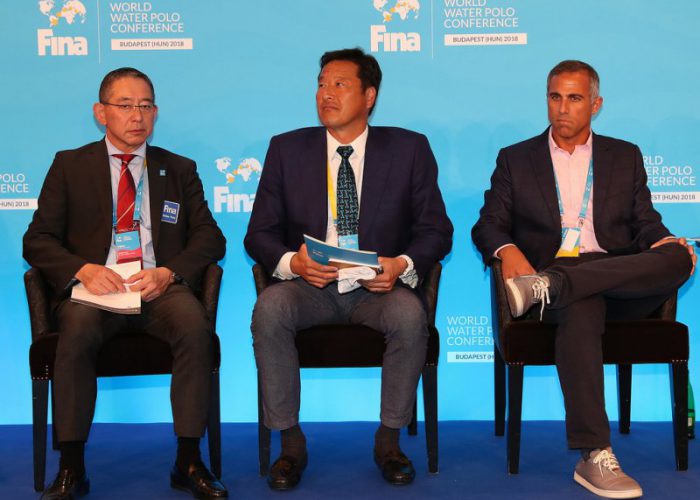
Translator, Japan Head Coach Yoji Omoto, US Head Coach Adam Krikorian. Photo Courtesy: FINA
Do we need to adapt the game so it’s more spectator friendly? Absolutely! Do we need to adapt the game so it has better flow? Absolutely. Do we need to encourage more driving? There is no doubt about that.
To focus on certain countries and make the rules for them—I’m against that. I really am. I’m looking for a completely neutral side. I don’t think that rules are for that. They are to regulate the game, not to favor one or the other country. That’s what we’re trying to get out of.
When it comes to strength and size, every person in the world has a different opinion. That’s the beauty of the discussion. But I love to work with facts. That’s how I function. I would like for anyone to tell me if there’s one sport in the world that didn’t evolve in the past 30 – 40 years in terms of height, strength and size of the players. I’d love to see a picture of LeBron James and Michael Jordan one beside the others. And to see if basketball didn’t evolve in that way
If someone can convince me in some sport it’s happening that way and I can see the evidence, then I will be all for that.
But, I doubt it.
– Specifically, the proposed rule change to make the center forward move seems like an obvious adjustment that would benefit many styles of play.
In regard to the center forward in basketball staying there with their backs to the [hoop], every sport is different. Playing in the water we have advantage and limitation. The three-second rule is not that easy to apply to water. On top of that, we do have one of the proposals that we will test, and we’ll see what the results are.
But those tests were done 20 years ago—and didn’t work so well. Players figure out in a second what’s happening. They’re putting two players in front of the goal and it’s even more of a mess there. Talking about this is great but you need to see in reality what’s happening—through testing—to analyze [the impact] through facts and statistics.
Don’t get me wrong; I’m not against that. For all of these 19 proposals, we absolutely need to test / know what will happen.
This is just one rule; the tough part is synchronizing new rules with what exists, and all the other new rules that are proposed and accepted. That’s a science that we can’t do during the game. It’s impossible. Coaches and players need to adopt that, they need to train under those conditions.
They need to play in conditions that matter [such as] championship games—competition where winning means a lot. And then, before testing everything else in games and analyzing and adapting it.
I’ve been in water polo for 35 years. I can’t tell you what it will look like. And whoever tells you he does know…I would question that. Because there’s so many rules, and I’m not sure that a combination of [old and new] rules—I’m not sure anybody knows how it will affect the game.
Are all of these 19 rules [changes] going to go through? I doubt it. I know a couple of them will not work with each other. But we need to start somewhere. And these are not the rules that we accepted for testing in Budapest [in 2017]. These are just ideas. The next step is those ideas have to be defined.
That’s not a job for me! That for somebody in a world with expertise for that.
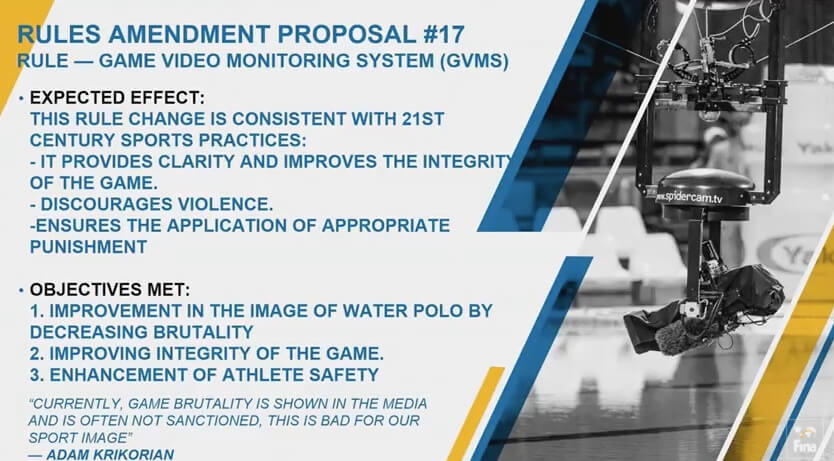
Photo Courtesy: FINA
– Among the “guidelines for the future” that you presented was a video review system for referees—which seems like a very practical tool to get calls right.
First of all it’s about the technology. We know for certain that FINA can do it because of the Olympic years and world championships. Those two competitions are top-notch. If you compare the world championship in Budapest last year with the world championship in basketball in Istanbul—also last year—I will guarantee you that it was way better organized, many more people in the stands, and an atmosphere… everything overall water polo was better.
That’s not the issue; the issue is what’s happening [in tournaments] below that level.
To get back to technology, it’s not easy. The whole idea of using a game video monitoring system came from a few cases we had in the past where the technology was missed by the referees—I’m not blaming officials at all when things are missed. They cannot see everything. But that doesn’t mean we can’t use 21st century technology for things that officials miss. Why can’t we make things right?
When I look from the spectator’s perspective it’s better that the game is stopped right away, video is reviewed, the correct decision is made. [That’s better] than seeing brutality two minutes after a game [ends] on Facebook and that brutality wasn’t punished.
– You are saying that all major moments in the game would be subject to review—not just controversial goals?
That’s the intention for this rule. It’s about the spectator’s experience. For a person who is not familiar with this sport, if we cannot explain what happened, then we’re in trouble. This video monitoring system is one thing. Another is using underwater cameras. We didn’t discuss that this time but I think this should be put forward. [Synchronized swimming] is using underwater cameras right now, so why wouldn’t we using them? It will help for exposure and for spectator’s overall experience. It will also help for the referee interpretation.
With all of these rules some of them should have been implemented 30 years ago. At least half of them are really easy changes. None of us needs any testing results to know that they will speed up the game. For example a rule that the foul is where the ball is and not where the foul was called. That rule was implemented in handball 30 years ago. And it sped up the game significantly.
We need forward to simplify the game; the simplicity of the game is beautiful. That’s something that we need.
Six objectives were created; the criteria are that every rule that we propose has to meet these at least one of those objectives. There was a clear process; we didn’t just come up with these ideas.
I’m proud to be part of that but also, I’m incredibly excited to see the huge—as one of my colleagues at the conference said—historic support in Budapest.
– How do you protect the decisions by referees when the rules they’re supposed to enforce lack clarity?
I’m demanding that the referees are included in this process. I’m also compare this [water polo’s situation] with all the other sports. If you can tell me one sport where the coach is happy with the referee I will not talk about water polo ever again.
In regard to officials, a water polo school has to be approved. Another thing is an official’s ranking [procedure] has to be created. And clear evaluation of the referees.
I’m not sure how this is done; I’m not a referee. I gather this is an evaluation but what I was told [it’s on a minimal level].
Joint discussions between coaches, referees and FINA people are necessary and incredibly important. This should happen after the season, not before the summer season starts. Multiple pairs of eyes are better to see things from different angles. At the round-table discussion in Budapest, Boris Margeta saw something in the rule proposals that we hadn’t seen in three months working on them.
– One reality is—whatever new rules are installed—the coaches will try to exploit them for their team’s benefit.
Every coach will do the same. That’s normal. Those coaches are winners. If you ask Greg Popovich about this I guarantee you he’ll give you the same answer.
After playing for 25 years on the highest possible level, then coaching for the next 10 – 15 years, I can say for myself that I wouldn’t be able to evaluate referees. That’s not my expertise. Even though I’ve been so involved in the game, I am not someone who could evaluate the officials. So, we need to choose the right people who can do that job.
– Given your vast experience with water polo all over the world, yours may be a unique perspective on the future of the sport.
I know the European side but I also know the North American side. And I have learned that one size doesn’t fit all. We absolutely have to adapt to different circumstances, environment and problems. Things that are working in Serbia will not work in Canada, Australia, the United States or China. It’s a different mentality, different cultures and different issues that countries are facing.
We need overall guidelines that are adaptable to the circumstances in each continent or country. That’s what I believe.
And that’s why I think I have an advantage. I lived in Serbia and Europe but I’ve also spent a number of years in North America and Canada. And I know the transition from one culture to another. I do have that experience and I’m trying to use it in the best possible way for water polo.
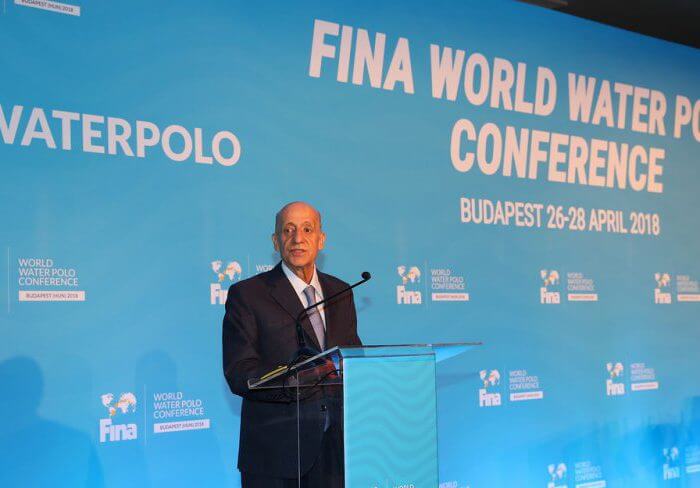
FINA President Julio Maglione. Photo Courtesy: FINA
– You talked about the need to invest in the business of water polo. Do you believe that FINA is prepared to make all the investment necessary to really improve polo?
I can’t answer that. I’m not part of FINA, I’m providing my ideas and expertise. I can only say that I do hope that is going to be the case. There were promises made at the conference, so we’ll have to see if they will be met. I will say that FINA President Julio Maglione from July 2017 said that a water polo conference would happen as soon as possible. He kept that promise and I’m confident that he will keep promises in the future.



